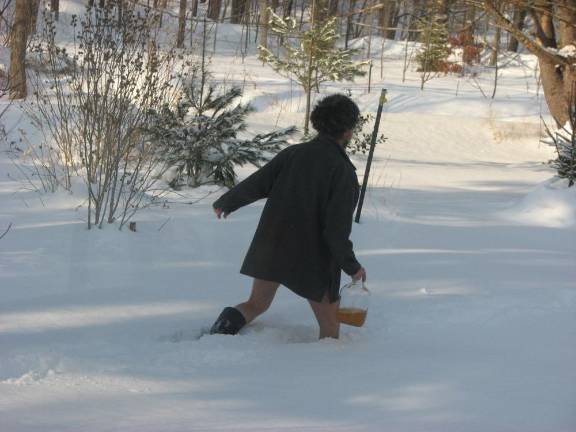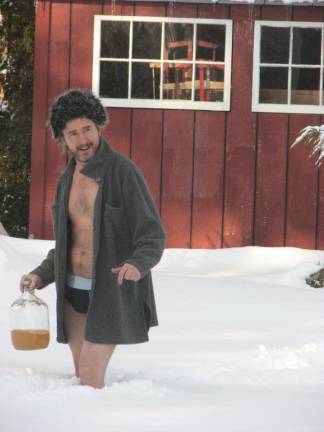Overwintering
Bears, trees and living cider rest through the dark, cold months – and in our own ways, so do we


December 21, one of the two great calendar dates. People throughout the Northern Hemisphere celebrate this benchmark in different ways, usually with religious overtones, but the one thing our various cultures have in common is that we recognized this as a time for introspection, celebration and rest.
Rest is understandable, given that we as humans are (or were) an agrarian sort and the winter caps our busy time. In the colder climates especially, we have a shortened growing season, so the prep work is particularly frantic the farther north you go. Then, when the ground freezes and the snow comes, there’s not much to do but rest. Rest.
Celebration is also understandable (assuming that we’ve done all the work to prepare for winter). Yes, it’s true that the modern economy never slows down anymore – we have lightbulbs and fossil fuel to blast our way through winter, we have food shipped from the other side of the world where crops are in season – but modern people still recognized the lack of daylight and the cold temperatures. We’ve injected seasonality wherever possible and use this to escape the day-to-day routine. If nothing else, we’ll celebrate that.
Introspection and celebration are surprisingly similar; one is simply the extroverted response to the other. Both activities pivot around the passing of time – be it the accomplishment of the recent past or the beginning of something new. But introspection is especially what winter’s all about. It is therefore no coincidence that our society encourages resolutions (New Year’s), sacrifices (Lent), and allocations (tax season) during winter. It’s as though we have no choice but to follow nature and incorporate dormancy into human-made structures. We take ourselves out of the game for the moment, take inventory of our personal and cultural lives, and assess the best way forward. And although a week of holiday parties is sometimes needed to prompt this response, in the end winter is a three-month period pre-mandated for introspection.
The apple tree is the perfect symbol of season response, and its progeny, cider, follows suit. In spring the apple tree pushes its energy up from the ground into its extremities to form new leaves and flower blossoms. Its outward gaze is so strong then that it blasts beyond the individual specimen and sends forth pollen. In summer the tree basks in the sun and incubates its seed, and in fall that seed is dispersed along with the dropping of leaves. Now, in winter, the tree’s energy returns underground where it concentrates. Bears do this, trees do this, and cider does it, too. Winter offers living things the chance to bottom out after a wild ride – through the growing season to the harvest, through a grinder to fermentation, the apple (and then cider) has been through a lot this year and it needs a chance to collect itself. Inside the winter barrels, that’s exactly what’s happening.
The physical protection of insulation is all-important for the wintering cider, but there is mythic significance to having the barrels in an environment that keeps pace with the ground temperatures. It’s the memory of the tree’s energy that signals the cider to hit dormancy in December and not wake until March or April. Think of the barrels as bears: It’s best for all parties just to let sleeping bears be.
The nights are clearest in January and February, and I sometimes get bundled up and head to a clearing in the woods. Without warmth or humidity blanketing the earth’s atmosphere, I can explore the nighttime sky free from the sheltering dome. It feels like there’s direct access to outer space and this planet is nothing more than just a rock, another asteroid. It feels like I can just float messages through the weightless abyss and connect with whatever sits on those other rocks out there.
I lie against the frozen slope of ground so I don’t have to crane my neck, and because I have no many layers on I can’t feel the cold through my clothes. Only my nose and eyes are exposed, leaving my muffled breath under the hood to further lend to the astronaut illusion. I came prepared to travel the expanses of space and have in my coat pocket my copilot: a 500 ml bottle of cider with a champagne cork.
Making cider means drinking cider. It means it’s in your hands nearly every night. This quality is shared by every cider maker I know, even the industrial producers with whom you’d think we have nothing in common. To outsiders this might appear like alcoholism, but we are actually quite moderate. I wouldn’t say we’re drunk or tipsy any more than your average person, and yet we do intentionally try to incorporate cider into every aspect of our lives. We may not physically have it with us, but it’s a relationship we don’t put down.
-Excerpted with permission from Uncultivated: Wild Apples, Real Cider, and the Complicated Art of Making a Living by Andy Brennan